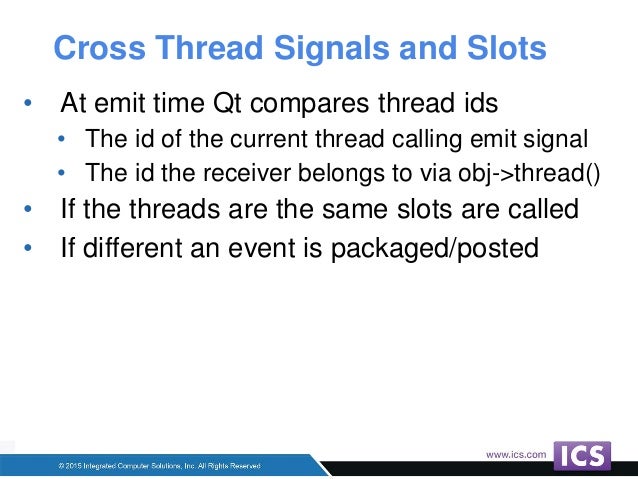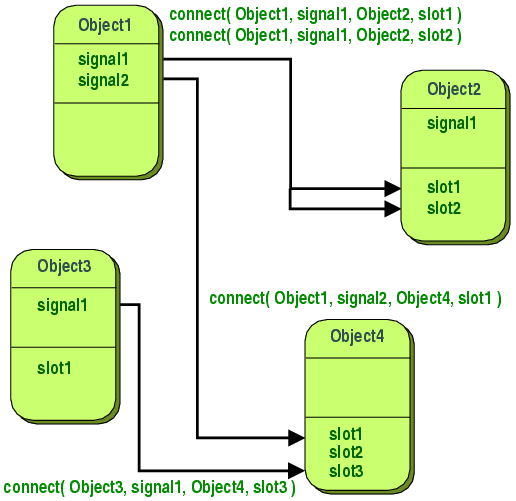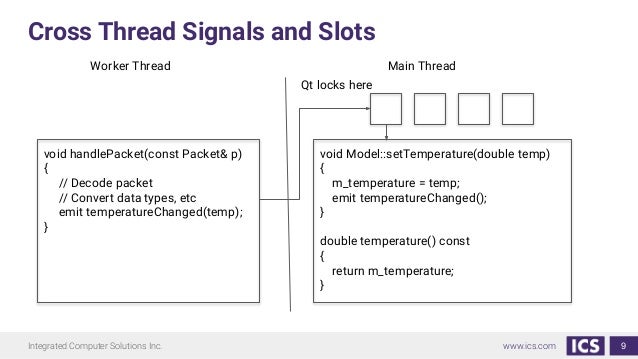Qt Signals And Slots Thread Safe
Signals and slots were one of the distinguishing features that made Qt an exciting and innovative tool back in time. But sometimes you can teach new tricks to an old dog, and QObjects gained a new way to connect between signals and slots in Qt5, plus some extra features to connect to other functions which are not slots. Qt Signal Slot Thread Safe Some examples of the games you will find are listed below. Table Games – The all-time classics! Live Casino – As close to a real-life casino Qt Signal Slot Thread Safe you can get! New Slots Machines – The 200-year-old one-armed bandit! Video Slots – Bringing the game to life! Asynchronous events are thread-safe. In fact, cross-thread signals and slots are based on asynchronous event. When a signal is emitted from an object in one thread to an object in another thread, there will be actually an event sent between the threads, assuming that the connection type is either automatic or queued. Qt Signals And Slots Thread Safe The games on this website are powered Qt Signals And Slots Thread Safe and operated by Aspire Global International LTD.
This page describes the use of signals and slots in Qt for Python.The emphasis is on illustrating the use of so-called new-style signals and slots, although the traditional syntax is also given as a reference.
The main goal of this new-style is to provide a more Pythonic syntax to Python programmers.
- 2New syntax: Signal() and Slot()
Traditional syntax: SIGNAL () and SLOT()
QtCore.SIGNAL() and QtCore.SLOT() macros allow Python to interface with Qt signal and slot delivery mechanisms.This is the old way of using signals and slots.
The example below uses the well known clicked signal from a QPushButton.The connect method has a non python-friendly syntax.It is necessary to inform the object, its signal (via macro) and a slot to be connected to.
New syntax: Signal() and Slot()
Qt Signal Slot Not Working
The new-style uses a different syntax to create and to connect signals and slots.The previous example could be rewritten as:
Using QtCore.Signal()
Signals can be defined using the QtCore.Signal() class.Python types and C types can be passed as parameters to it.If you need to overload it just pass the types as tuples or lists.
In addition to that, it can receive also a named argument name that defines the signal name.If nothing is passed as name then the new signal will have the same name as the variable that it is being assigned to.
The Examples section below has a collection of examples on the use of QtCore.Signal().
Note: Signals should be defined only within classes inheriting from QObject.This way the signal information is added to the class QMetaObject structure.
Using QtCore.Slot()

Slots are assigned and overloaded using the decorator QtCore.Slot().Again, to define a signature just pass the types like the QtCore.Signal() class.Unlike the Signal() class, to overload a function, you don't pass every variation as tuple or list.Instead, you have to define a new decorator for every different signature.The examples section below will make it clearer.
Another difference is about its keywords.Slot() accepts a name and a result.The result keyword defines the type that will be returned and can be a C or Python type.name behaves the same way as in Signal().If nothing is passed as name then the new slot will have the same name as the function that is being decorated.

Examples
Qt Signals And Slots Thread Safe List

The examples below illustrate how to define and connect signals and slots in PySide2.Both basic connections and more complex examples are given.
- Hello World example: the basic example, showing how to connect a signal to a slot without any parameters.

- Next, some arguments are added. This is a modified Hello World version. Some arguments are added to the slot and a new signal is created.
- Add some overloads. A small modification of the previous example, now with overloaded decorators.
- An example with slot overloads and more complicated signal connections and emissions (note that when passing arguments to a signal you use '[]'):
- An example of an object method emitting a signal:
- An example of a signal emitted from another QThread:
- Signals are runtime objects owned by instances, they are not class attributes: